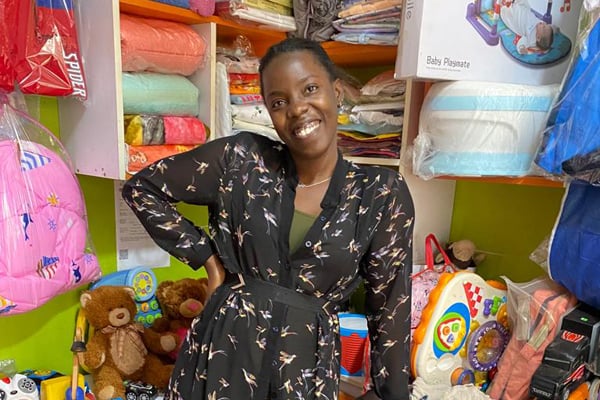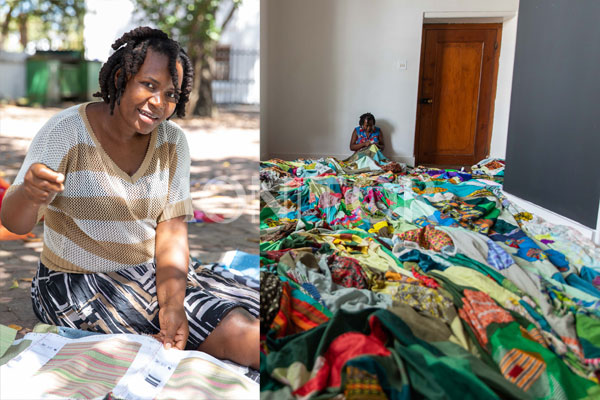Prime
Nabakabya mints money from children fashion

Latifah Nabakabya in her children’s shop. She started the business out of the Covid-19 blues. Photos/Joan salmon.
What you need to know:
- Just as the Covid-19 pandemic emptied out offices, many businesses were born. Resh kids’ Collection is one of those. Proprietor Latifah Nabakabya is now reaping for starting out something in children’s fashion.
While Covid-19 left many is despair, it was a springboard to many innovations and businesses. Resh kids’ Collection was one of the Covid pandemic babies because Latifah Nabakabya started it after the first lockdown (2020). Situated near St Raphael Hospital, Nsambya, the shop deals in children’s clothing; from new born babies to 12 years as well as pregnant mothers’ items.
Coming from a family of only girls, Nabakabya was inspired to start the shop because she wanted to dress up girls. “I felt I was well suited to do it and would give it my best,” she says.
Before lockdown was instituted, Nabakabya had graduated with a Bachelor’s degree in Business Administration specialising in finance from Makerere University Business School. Just like everybody else, the effects of the lockdown made it harder for her to get a job inasmuch as she sought for it.
Having seen her hustle, her aunt gave her Shs4m to start a business. “I am thankful for this gift from my aunt because had it been a loan, as a starter, in these post-Covid times it would have slowed growth,” she shares.
Nabakabya used the money to buy startup stock at Sasa Arcade after a lot of inquiries and price comparison. These included new-born baby items such as overalls, towels, stockings, urine mats, baby bed sheets, diapers, receivers, blankets, mosquito nets and sweaters. She also got clothes for pregnant mothers such as maternity pants, night dresses, mama kits, and cotton.
“From the capital I was given, I used Shs2.3m for children’s products, Shs500,000 for pregnant mothers’ products while Shs100,000 was spent on Facebook adverts. At that time, I had got the money for rent so I kept the rest for buying those things people might need yet are not in my stock,” she said.
That said, the start was not easy at all. “It started with looking for a location, then came the worry of where to get stock, and paying rent. Honestly, it was stressing but it is a good feeling to own my business,” she says.
Nabakabya’s first customers were her family and friends. “It was these that I had told I was opening up a children’s shop. They thus got everything they needed from me and I did not charge them a lot because they were my first customers. While I did not get a lot of profits per say, it was a good feeling to make sales,” she smiles.
From these, Nabakabya learnt that while friends can support one’s business, they tend to take their friends’ businesses for granted.
“For instance, if the item is worth Shs50,000, some may want to buy at Shs35,000 because you are friends. With that, I learnt and purposed to separate friendship from business.”
Pricing is a very big part of any business and when not done right, the venture will not realise profit.
Nabakabya learnt costing and pricing from a friend who introduced her to most of the suppliers of the items in the shop. “One of the things she taught me was the need to look around to compare prices because every shop has its own pricing. The other was that when buying stuff, it is cheaper to buy in bulk rather than pieces. That way, I can make meaningful profit,” she shares.,
Marketing
Nabakabya gets most of her customers by doing online marketing on Facebook and WhatsApp. That said, owing to her location, her customers also encompass people from the hospital. “I also tap into my social networks hence get customers from friends as well as my church family,” she says.
Expenses and earnings
Despite being close to a hospital, sales are dependent on seasons. That said, in a month, the gross sales range between Shs200,000 and Shs600,000.
“Some days are better than others. At times, God can bless me with a client that pays up to Shs500000 which ultimately makes the month a good one,” she shares.
In regards to expenses, averagely, they are Shs970,000 including rent, rubbish collection fees, electricity, and transport.
Hurdles
Save the fears she had when starting up, Nabakabya has experienced difficulties over the years. These include ever increasing prices when she goes for restocking, increasing transport costs, some customers failing to pay delivery fees, losses when doing online sales and purchases, high import taxes as well as high rent and maintenance costs. “These are continually lowering our profit margin. That said, we just cannot throw in the towel. A small profit is better than no source of income at all,” she says.
Sad moments
Being an entrepreneur calls for a thick skin because there are instances that turn a bright day into a sad one. Nabakabya has had these moments.
“Sometimes, customers make orders which necessitate making orders. However, after spending the money, they do not buy what they asked for which causes financial loss because the order is usually customised for their needs. The other that stands out was during one of the first months when I went to work and the shop was closed due to unpaid rent.”
Triumphs
In the past two years, the customer base has widened which has led to an increase in profits.
“By the end of last year, I had started shipping in my own items. Additionally, the business grew to a point where it could handle its own expenses. That meant that I no longer had to dip into my pocket to sustain it which was a huge milestone,” she says.
Lessons
Every challenge presents a lesson to help her run the business better and over the years Nabakabya has learnt not to trust anyone in running the business.
“To succeed in business, you need to do most of the things yourself rather than delegate. That helps you account for your actions better as well as avoid financial and stock losses whose origin you cannot trace,” she says.
Doing business that way has helped her manage the shop business well and know what it needs to grow.
I wish I knew…
Where to get products on wholesale prices. However, some people are not open. That said, with time, as networks have grown, I have learnt. That is why I value social capital.
Future
She is looking forward to expanding the shop to be a wholesale point for everything concerning new born babies, children and pregnant women items.





